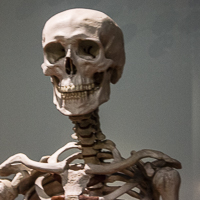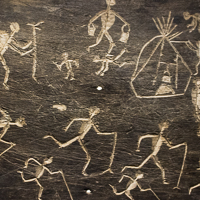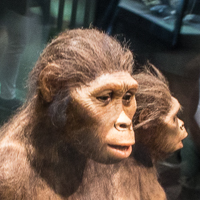
About the Collection
The museums strives to bridge the gap between professional science and popular science, which leads it to wade into potentially controvertial topics when divisions between academics and non-scientists become too large. Disagreement over human evolution is not new, but scientific advances in recent years that go well beyond Darwin tend to be ignored in the debate. The Hall of Human Origins does not preach, but rather presents the genetic and paleontological evidence supporting human evolution in a thorough and organized way. A visit here should end the debate.

What You Will See
Other collections in the museum are just that: collections of related articfacts and scientific topics. The Hall of Human Origins is different. As the theory of human evolution is one of the most misunderstood areas of modern science, the Hall presents the evidence for it drawing on fossil records, modern understanding of animal biology and genetic advances. The result is a unique, cross-discipline gathering of exhibits to help the public understand the current science. You will see fossils, skeletons, dioramas of early man and a particularly interesting section devolted to the things we think make us unique in the animal kingdom: language, art and music. It is one of the most important and enlightening collections in the museum.

Why You Should Go
Wherever your current understanding of human evolution, an afternoon in this hall will change it, challenge it and enhance it. Advances in this area are surprisingly recent, with new additions from the fossil record and genetic research occuring within the last decade. New footprints, new discoveries of paleolithic tools and new DNA samples advance our understanding of our own unique place in the animal kingdom. They are carefully and convincingly presented as science, without judgement or debate, together with acknowledgements that there is something very special about humanity that distinguishes it from our genetic ancestors.




